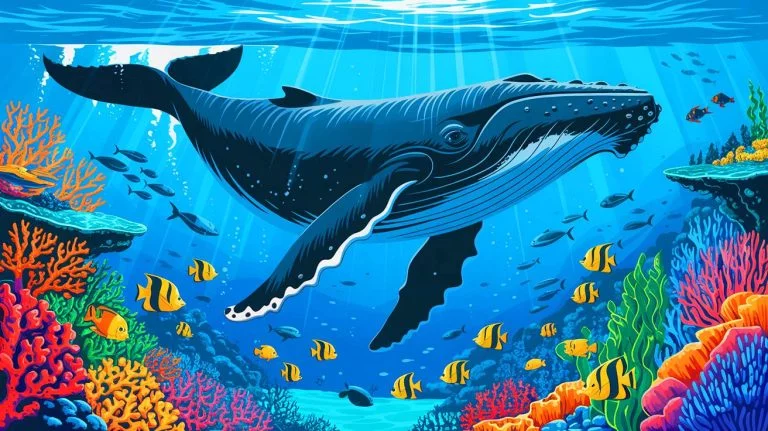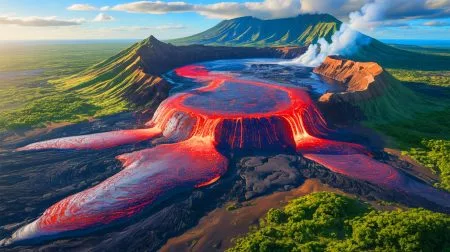| IN A NUTSHELL |
|
The vast, mysterious oceans of our planet hold secrets that continue to astonish scientists and environmentalists alike. One of these secrets involves the unexpected ecological role of whales. These majestic marine mammals, often celebrated for their size and grace, are now being recognized as vital components of the ocean’s nutrient cycle. Recent studies have illuminated how whale urine, rich in nitrogen, acts as a crucial nutrient delivery system across the globe, fundamentally supporting marine ecosystems and promoting biodiversity. But how exactly do these gentle giants perform such a critical environmental function?
The Great Whale Pee Funnel: An Ocean-Wide Transfer System
Recent research has introduced the concept of the “great whale pee funnel”, a fascinating process by which whales transport vast amounts of nitrogen across oceans. This process begins in the nutrient-rich polar feeding grounds. Here, great whales like humpbacks, grays, and right whales consume ample food, storing energy in the form of blubber. As they migrate to tropical waters, they release nitrogen-rich urine, effectively fertilizing coral reefs and coastal ecosystems that are often nutrient-deficient.
According to a study published in Nature Communications, whales are responsible for transferring over 4,000 tons of nitrogen annually. This nutrient transfer is essential for the growth of algae, plankton, and coral, providing a vital link in the ocean’s food web. This revelation builds upon the earlier discovery of the “whale pump,” which described how whale feces enrich surface waters with nutrients, supporting plankton growth.
Whales as Capital Breeders and Their Ecological Impact
Baleen whales, classified as “capital breeders”, exhibit a unique biological cycle that further highlights their ecological importance. These whales feed intensively in high-latitude, nutrient-rich areas such as Alaska and fast while breeding and nursing in nutrient-poor tropical regions like Hawaii. This fasting period results in the breakdown of substantial fat reserves, producing nitrogen-rich urine.
For instance, fin whales in Iceland can produce over 250 gallons of urine daily, a stark contrast to the less than half a gallon discharged by humans. This urine, rich in urea, serves as a potent fertilizer in oceanic regions that face nutrient shortages. It supports the growth of marine life over thousands of miles, creating a dynamic and interconnected ecological network.
Rebuilding Whale Populations: A Path to Ecological Restoration
The role of whales in nutrient distribution was significantly hampered by commercial whaling, which drastically reduced their populations. Before this decline, the nutrient flows facilitated by whales were estimated to be up to three times greater than they are today. Conservationists like Joe Roman, a study co-author, argue that increasing whale numbers is not just an act of conservation but a critical step in restoring a global ecological system.
Whales act as the ocean’s circulatory system, moving nutrients that sustain life across vast distances. Their presence and health are indispensable for maintaining the balance and productivity of marine ecosystems. As Roman eloquently puts it, “We often think of plants as the lungs of the planet. Animals are the circulatory system.”
Nutrient Flows and Their Broader Ecological Significance
The nutrient flows facilitated by whales have far-reaching effects beyond just marine life. These flows support the entire oceanic food chain, impacting everything from the smallest plankton to the largest ocean predators. By aiding in the growth of foundational species like algae and plankton, whales indirectly support fisheries, which are crucial for human consumption and economic activity.
The staggering movement of over 45,000 tons of biomass annually by whales underscores their ecological significance. In areas where whale populations are healthy and thriving, the available nitrogen levels can more than double, reaffirming the importance of their role in nutrient cycling. As ecosystems globally face increasing pressures from climate change and human activity, understanding and supporting such natural processes becomes ever more crucial.
As we continue to uncover the myriad ways in which whales contribute to our planet’s health, it prompts a broader question: In what other unexpected ways might the natural behaviors of animals be supporting the ecosystems we rely on, and how can we best protect these vital processes?
Did you like it? 4.5/5 (22)








Wow, I never knew whale pee was such a big deal! 😂
This is why we should protect our oceans! Thanks for sharing this info.
Are there any negative impacts of excessive nitrogen from whales?
Does climate change affect these nutrient cycles?
How do whales know where to release their urine?
Why don’t we hear more about the ecological importance of whales?
Is this new information changing how scientists view marine ecosystems?
It’s amazing how interconnected everything is in nature! 🌐
How exactly do they measure 4,000 tons of nitrogen from whale urine? 🤔
How did scientists first discover the role of whale urine?
This article blew my mind! 🌟
Is the impact of whale pee similar to the whale pump mentioned?
What are the long-term benefits of rebuilding whale populations?
Does this mean more whales could help combat climate change?
I never thought I’d read about pee being important. 😂
Does the article mention other animals with similar ecological roles?
How do whales manage to spread nutrients over such vast distances?
This is both hilarious and educational. Thanks! 🤣
I’m skeptical about how much pee can really affect the ocean. Is there solid evidence?
Does the nitrogen help all marine life equally, or are some species more benefited?
Are there any risks involved in studying whale urine? 🐋
Great article! Would love more like this on ocean science. 🌊
The ocean is truly a mystery. What else don’t we know? 🌊
Are there any other articles on this topic? I’m intrigued!
Is whale conservancy a priority in most marine protection plans?
Thank you for the enlightening article! I appreciate learning about nature’s wonders. 🌍
This sounds like a whale of a discovery. 😆
Rebuilding whale populations seems crucial. How can we help?
Is there any impact on human activities like fishing due to these nutrient flows?
Fascinating! Can this study help in the conservation efforts?
Is the “whale pee funnel” a widely accepted scientific term? Sounds funny! 😄
I wonder what other animal secrets are out there in the ocean. 🌊
Can someone explain how whales act as a ‘circulatory system’?